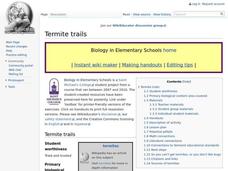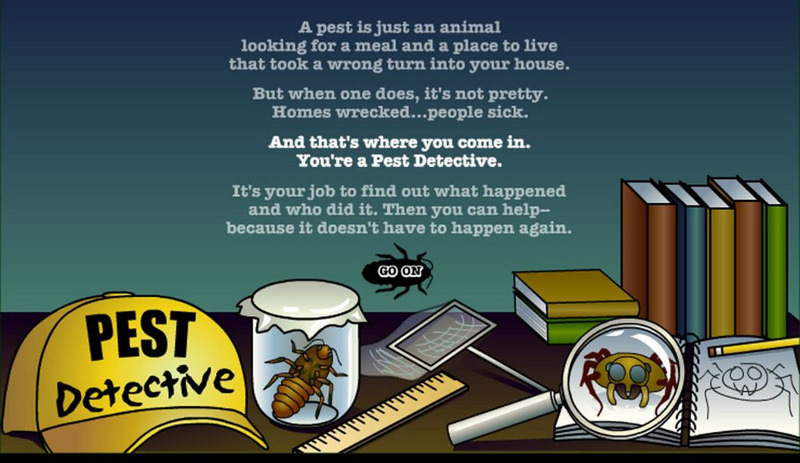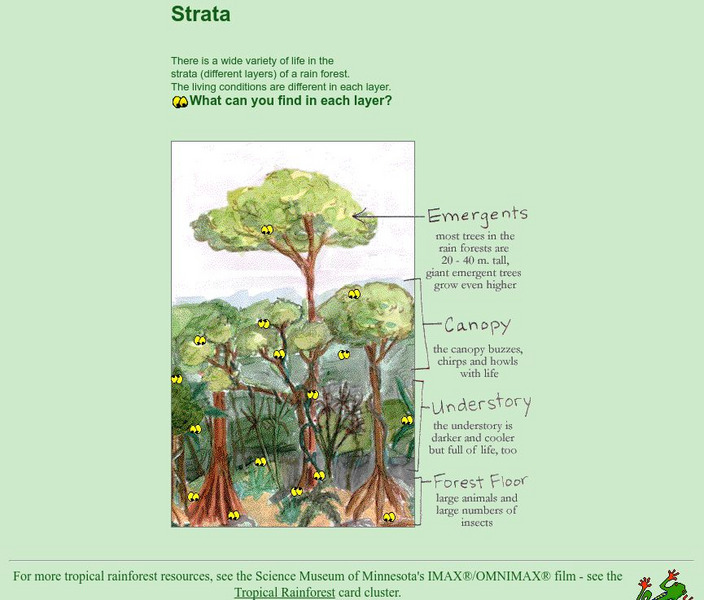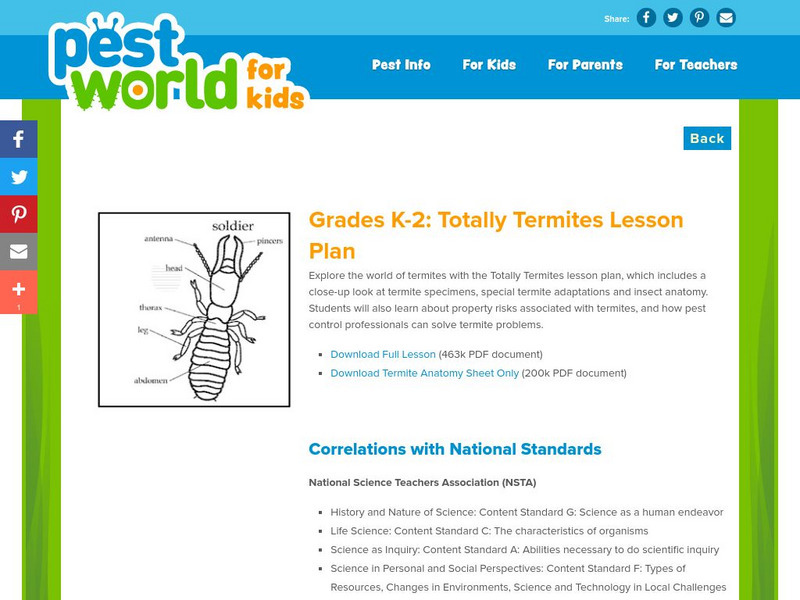Core Knowledge Foundation
Insects Tell It Again!™ Read-Aloud Anthology
A read-aloud anthology explores the world of bees, wasps, beetles, termites, ants, fireflies, and more. Scholars listen to stories and discuss topics and practice word work. Extension opportunities keep the learning going in and out of...
Science Friday
Termite Symbiosis
What happens to the wood a termite eats? Pupils learn about the three types of symbiosis with pictures of symbiotic pairs. Afterward, they determine whether there is a symbiotic relationship with a termite by dissecting termites and...
Curated OER
Termite Trail Marking Behavior
Learners examine termites and their trail-marking behaviors. They draw lines on paper with various ink pens and experiment to see which types of ink the termites follow--or which inks do and do not elicit trail marking behavior.
Curated OER
Termite Trails
Students observe termite trail-following behavior. In this termite trails lesson, students draw a circle or other shape approximately eight inches across with a ball point pen. Teacher taps out termites into the circle and...
Curated OER
Termitology
Students engage in an inquiry-based study of the ecology of termites. Through hands-on investigations, they explore the life cycle of termites, the termite's role in the food web, and the unique social structure of termite colonies.
Curated OER
Totally Termites
Students explore the world of termites, their adaptations, and anatomy. They examine the property risks of termites and how pest control professionals manage termite problems.
Curated OER
Termite Lab
Students examine insect behavior in a lab activity. Students explore the idea of chemical specificity and the reactions of termites to a chemical found in their trail pheromone. Students watch a demonstration with termites before...
Curated OER
Termite Trails
Pupils observe the behavior of termites and draw conclusions about their behavior. They record data as to termite behavior and recognize elements in the experimental design which must include a hypothesis.
Smithsonian Institution
Smithsonian National Zoo: Zoogoer Magazine: The Marvelous Majority
This article examines a range of invertebrates. Among the invertebrates discussed included are jellyfish, coral, termites, gypsy moths, octopus, crayfish, and more.
National Pest Managment Association
Pest World for Kids: Pest Detective
As a Pest Detective in this game, you must identify the type of pest infestation in a house, and how it happened. You have two cases to solve - The Case of the Collapsing House and The Case of the Gruesome Bite. Once you have examined...
University of Michigan
University of Michigan Critter Catalog: Insects
A thorough site that provides a description of the characteristics of insects and then focuses on the insects of southeastern Michigan. Pictures, classification groupings, and sound clips of insects are included.
PBS
Pbs: Nature: Alien Empire
Outstanding site that compliments an insect series on PBS. Interactive presentations include bee anatomy and honeybee hives. Includes interactive puzzles, teacher's guides, and formats for making insect masks.
Science Museum of Minnesota
Science Museum of Minnesota: Rainforest Strata
This site provides a picture on the layers of the rain forest with yellow eyes all over. You click on the yellow eyes and learn about an animal. You may have to search for it by going to the home page.
National Pest Managment Association
Pest World for Kids: Termitology
An inquiry based lesson plan that delves into termite biology, distribution and habitat, life cycle, social structure, and the role of termites in nature and the food chain.
PBS
Pbs Nature Critter Guide: Mammals: Aardvarks
This PBS Critter Guide gives a brief description of the aardvarks life and habitat. This site would be useful for students who need help narrowing their Internet research information into a manageable amount.
A-Z Animals
A Z Animals: Animal Facts: Termite (Isoptera)
This entry identifies the defining characteristics of the Isoptera, more commonly known as the termite.
American Museum of Natural History
American Museum of Natural History: Termites O Logy Card
Turn over this interactive OLogy card to find fast facts, questions and answers, and similar bite-size pieces of information to help you understand termites.
Iowa State University
Iowa State University: Iowa Insect Information Notes Termites
Termites feed on wood and can cause structural damage to furniture and homes. This article is about termites as pests and what can be done when there is a termite problem.
National Geographic
National Geographic: Blog: "Fairy Circles" Explained
This article describes how termites create circular patterns of bare soil known as "fairy circles" in the grasslands of southern Africa.
Other
Orkin: Termites
How can you protect your home against termites? Read about a few ways to prevent termites from taking up residence in your home as well as waring signs that they have come for a visit.
African Wildlife Foundation
African Wildlife Foundation (Awf): Aardvark
This resource takes an exploratory look at the aardvark, a nocturnal animal with exceptional digging abilities. Content includes information on the aardvark's physical characteristics, habitat, behavior, diet, caring for the young,...
National Pest Managment Association
Pest World for Kids: Totally Termites
Explore the world of termites with this lesson, which includes a close-up look at termite specimens, special termite adaptations and insect anatomy. Students will also learn about property risks associated with termites, and how pest...
National Pest Managment Association
Pest World for Kids: Termitology
This lesson will engage students in an inquiry-based study of the ecology of termites. Through hands-on investigations, students will explore the life cycle of termites, the termite's role in the food web, and the unique social structure...






















